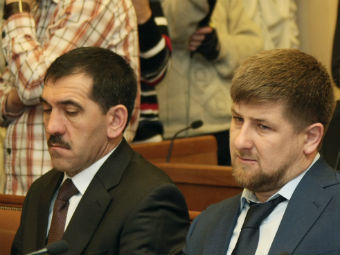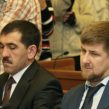
Relations Between Leaders of Chechnya and Ingushetia Deteriorate
Publication: Eurasia Daily Monitor Volume: 9 Issue: 172
By:

In the wake of hostile exchanges between the Chechen and Ingush governments that started in late July, relations between the two republics could again seriously deteriorate following Chechen law enforcement actions on Ingush territory. Back in July, according to the Ingush side, an accidental explosion in the village of Galashki killed three Chechen militants, one of whom was identified as an influential insurgent commander in eastern Chechnya, Zaurbek Avdorkhanov (www.stav.kp.ru/online/news/1210963/). The slain commander was considered the primary mastermind and one of the principal perpetrators of the attack on Ramzan Kadyrov’s home village of Tsentoroi in August 2010 (www.youtube.com/watch?v=sJWOoH7LeYA).
The slain insurgent leader was so well known that Kadyrov hurried to offer his version of the death of the three rebels in Galashki. According to the Chechen side, the three rebels were lured into a house on the outskirts of the village and killed by Chechen law enforcement personnel (https://lenta.ru/news/2012/08/04/mortalkombat/). The leader of Ingushetia, however, was forced to deny there had been a special operation, saying that Chechen law enforcement heard of the slain people only a day later after they were asked to retrieve the bodies (www.rosbalt.ru/federal/2012/08/03/1018515.html). The Ingush authorities’ fervent denial of Chechen police participation in this special operation is explained by their desire to prevent even the symbolic spread of Ramzan Kadyrov’s influence to Ingushetia. The issue is not only one of strained personal relations between the heads of Ingushetia and Chechnya; ordinary residents of Ingushetia are also frightened of Kadyrov’s influence in their republic. Ingush society is very sensitive to any hints of a possible unification with the Chechen Republic. The Ingush have not forgotten that from 1934 to 1992, when they were part of the Checheno-Ingush republic, Ingushetia was considered an unprofitable periphery for investment from the republican budget. It is therefore not surprising that in the argument between the two heads of republics, the Ingush rallied behind Ingushetia’s leader Yunus-bek Yevkurov, while few people in Chechnya were interested in who killed whom in the Ingush village of Galashki.
The issue of who carried out the operation in Galashki eventually turned into claims on Ingush territory by Kadyrov. Bearing in mind that Ingushetia, with its 3,500 square kilometers, is the smallest republic in the Russian Federation, this claim was among the most painful that Ingush could hear (https://argumenti.ru/print/society/2012/09/200298). Because the two groups, Chechens and Ingush, are so close to each other ethnically, it is very hard to draw a line between them. The Orstkhoi, a Chechen sub-ethnic group that lives along the administrative border between the two republics, indicate they are Chechens when in Chechnya and Ingush when they are found in Ingushetia. It appears Kadyrov used the territorial claims to gain some concessions from the Ingush government.
Against this backdrop, the news about a new special operation by the Chechen police on Ingushetia’s territory on September 18 is likely to further exacerbate the tensions between the two republics. Reportedly, five militants from Chechnya were killed in the operation. Kadyrov boastfully informed news agencies that Yevkurov had not known about the special operation and that Ingushetia’s police had not arrived at the scene of the incident (www.interfax-russia.ru/South/news.asp?id=345703&sec=1672). Kadyrov was thereby emphasizing that Chechen forces had bypassed Ingushetia’s police. Three out of five of the slain militants were identified by their last names—Makhauri, Albakov and Dzeitov—and as leaders of the Sunzha armed resistance group. All three, according to an RIA Novosti source in Ingushetia’s police, had been on the federal wanted list (www.ria.ru/defense_safety/20120919/754024089.html).
Kadyrov made yet another statement that was overshadowed by others, one that explains why Ingushetia’s police did not know about the special Chechen police raid in one of Ingushetia’s largest towns, Ordzhonikidzevskaya. This town is better known by its old name, Sleptsovskaya, and is situated in the center of Sunzha district. Any special operation carried out by Chechen police would not have remained unknown to the Ingush government. Apparently, in this case, and Kadyrov confirmed it, the operation was carried out jointly with the Federal Security Service (FSB) (www.tass-ural.ru/lentanews/unichtozhennye_na_granitse_chechni_i_ingushetii_boeviki_nakhodilis_v_rozyske.html). Since the FSB is an organization that has no territorial boundaries, it is not required to warn local authorities of a special operation unless it needs help from them. Thus, the FSB branch in Chechnya enabled Kadyrov to hush up an operation in the neighboring republic.
According to Chechen authorities, government agents were chasing a car that crossed from Chechnya into Ingushetia but proceeded only for a little more than six kilometers into Ingushetia before intercepting the vehicle (https://maps.yandex.ru/?ll=45.078082%2C43.295935&spn=0.322723%2C0.135666&z=12&l=map&rl=45.06503526%2C43.31872616~0.07484436%2C0.00601590). Six kilometers is the exact distance between the Chechen-Ingush administrative border and the town of Ordzhonikidzevskaya, where the Chechen government forces carried out this special operation. At the same time, the FSB’s branch in Ingushetia did not mention that Chechen forces took part in the special operation (www.interfax-russia.ru/South/news.asp?id=345704&sec=1672). Entirely contradicting the earlier statement by Kadyrov, Yevkurov said that this special operation had been in works for the previous three weeks and that Ingush police took part in it (www.kavkaz-uzel.ru/articles/212835/). Apparently, the lines of communication between the two Moscow-imposed bureaucrats are so impaired that they are able to resolve their differences only via the Kremlin. This is the reality of today’s Russian Federation.
This small skirmish between the leaders of two North Caucasian republics reflected a more widespread crisis of federalism in the country. Previously, the crisis would reveal itself in multiple coordination issues between regional branches of federal agencies, such as the FSB, the interior ministry, the ministry of defense and others, that would have to be resolved in their respective headquarters in Moscow. Today, the same virus has infected the regional governors. The federation is bursting at the seams, and the process is being felt most acutely in the North Caucasus.




